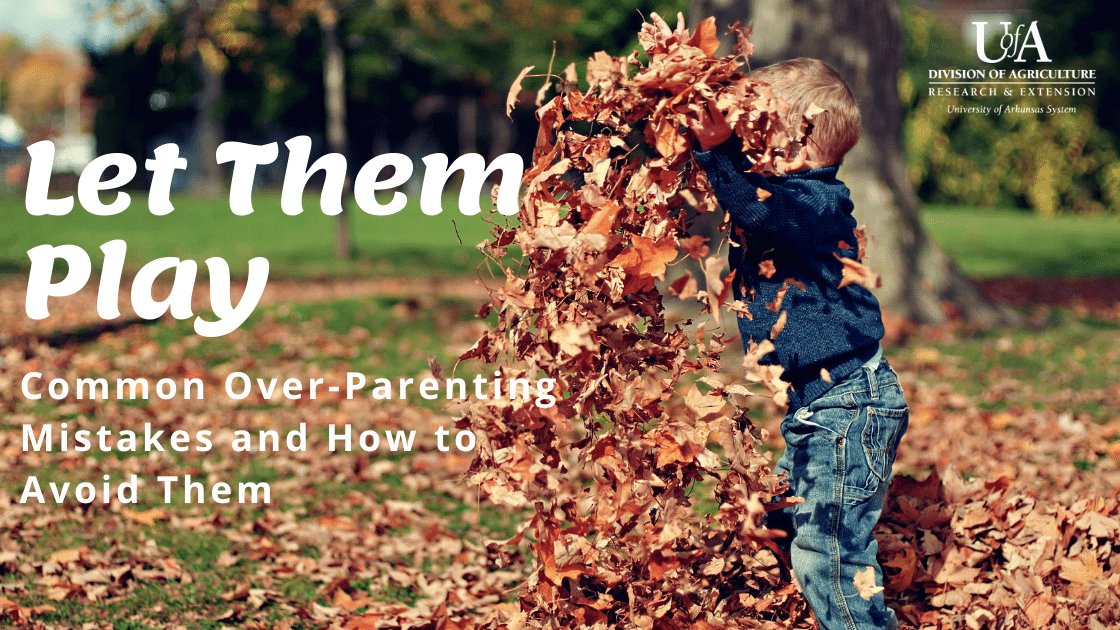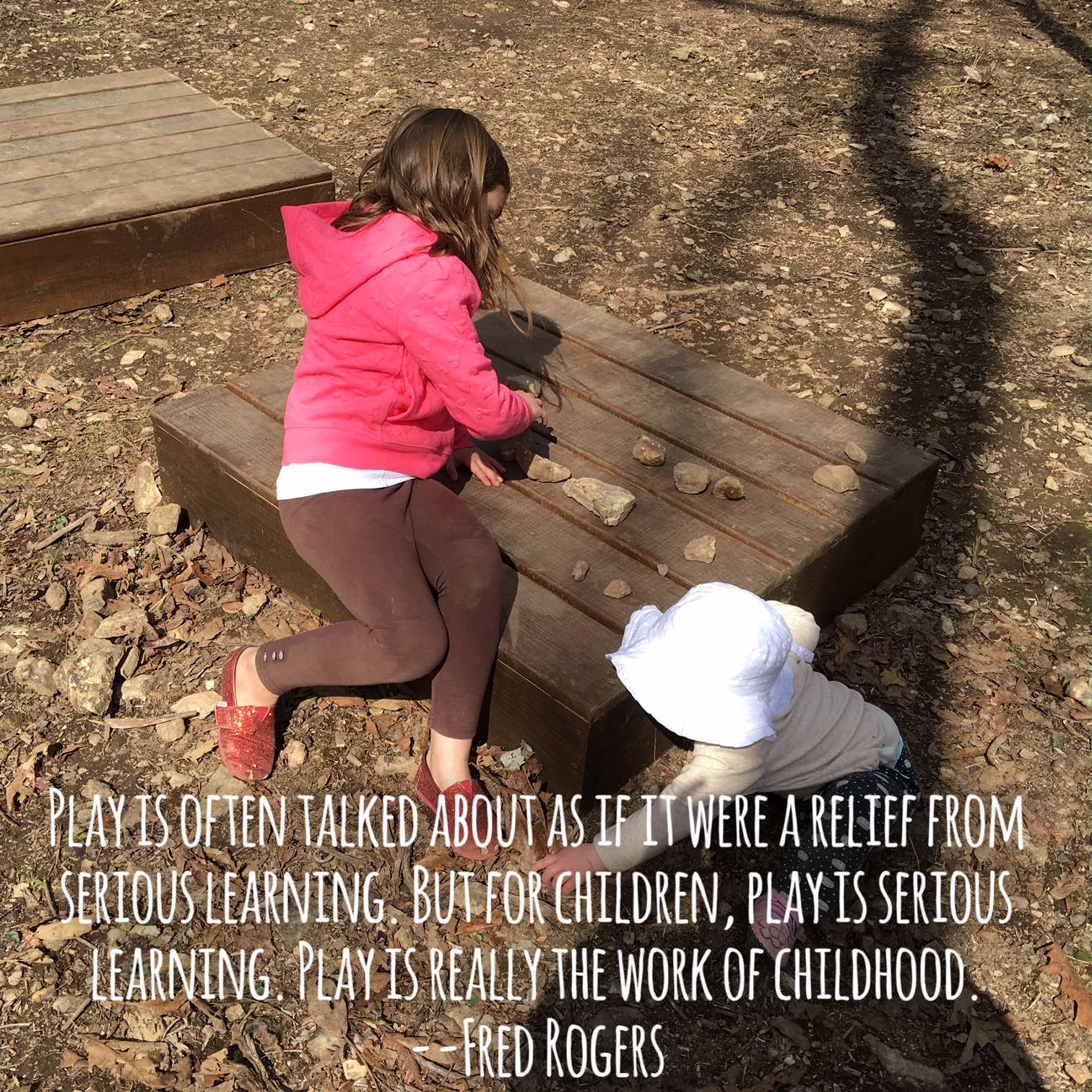Common Over-Parenting Mistakes and How to Avoid Them

Fred Rogers, more widely known as Mister Rogers, offered uncanny insight into the lives and thoughts of children. One of his more well-known statements relates to childhood and play,
"Play is often talked about as if it were a relief from serious learning. But to a child, play is serious. Play is really the work of childhood." --Fred Rogers
Sometimes, parents may forget that playing is not a waste of time. Our busyness often tricks us into believing that any time spent in unstructured play is not useful or helpful. Not only is that a myth, it is a potentially damaging stance to take with young children. Play is crucial to healthy child development, and unstructured play is far from wasteful. Children are inherently curious and compelled to explore their surroundings. While this might be exhausting to the parent of a toddler or preschooler, it is necessary for the brain. Important cognitive, social, and emotional needs are being met by unstructured and uninterrupted play. When parents interfere or facilitate things that a child can do for her/himself, they inhibit the learning process. Many of the tendencies modern parents show toward interfering in play fall under the term "over-parenting" or "helicopter parenting."

5 Common Over-Parenting Mistakes
"Helping" a child who can do something on their own:
It is perfectly normal and understandable to want to help children in our care succeed. We also have ideas about how things should go and how they should be accomplished. When we see a child struggling to complete a task or completing it in, what we see as, an inefficient way, we may be compelled to step in and help. Unless your child asks for help or they are in danger of harming themselves or others, let them fumble with the task. If they ask for help, only offer the amount of help needed to get them to the point where they can do it alone. For example, if a child is trying to get a cup of milk, instead of getting the cup and filling it yourself, let them get their own cup and, depending on the weight of the milk carton, either lift it and let them guide it or let them pour while holding the cup steady. You will show confidence that your child can succeed, and your child will feel far more accomplished and independent. Children of parents who do things for them that they could do alone tend to show less self-confidence and more permission-seeking behavior. The hardest part of this is allowing children to make mistakes. Although it is difficult to watch your child fail, it is an important part of their development.
Feeling the need to provide structured activity for playtime:
In the age of Pinterest and other social media outlets, it is common to want to make moments spent with our children into special times. We pack in activities and we want to make sure they are learning every minute. We hope that by giving them these activities, they won't get bored. In reality, we are probably doing more harm than good in giving our children too much adult-led playtime. When we offer our children structured activities and limit their free-play time, we unintentionally limit their creativity and interfere with their ability to self-govern. Kids who aren't allowed creative, child-directed playtime (even if that time is spent with a parent) tend to be easily bored and have difficulty coming up with things to do on their own. Why? Because they are used to an adult telling them what to do next. Allowing your child to play alone or with other children without the interference of an adult is how they learn to problem-solve and create. So, while we think we're keeping them from boredom, we're actually causing it.
Offering unwanted guidance:
We've already covered helping children who can do things alone, but a related issue is stepping in to offer guidance when your child already has a plan. Many of us have experienced this sort of thing while trying to help a child with homework. You know how to complete the problem. You see them doing it "wrong." You attempt to save them by telling them how to do it. Another common example is the class project. You have an idea. Your child has an idea. You try to force your idea when your child really wants to do theirs. If your child is working on a project, and they have a plan, let them have it. Again, unless they are in danger of hurting themselves or someone else, let them have it. It's ok if their Valentines Day box isn't the most spectacular in the class. If they want to make it themselves, give them that chance. They will probably smile just as widely in the class picture as the kids whose parents did the entire project without them. Let them guide you rather than the other way around. Allowing your child the room to be creative and to follow through with plans boosts self-confidence and leadership skills.
Overscheduling children:
Parents and kids are busier than ever before, and much of that busyness is of our own making. If you have the means to offer your children opportunities for extra curricular activities, and the child wants to participate, sometimes it is hard to say no. However, what ends up happening, especially in families with multiple children, is an unnecessarily high level of stress in maintaining that busy schedule. If you have three children and each of them is in two activities, when does anyone get a chance to slow down? Yes, choosing between activities can be difficult, but giving kids unstructured time and families time to rest is extremely important. Learning to make choices and to say "No" early in life can help your child maintain their sense of independence and confidence.
Assuming that learning and play are separate:
It is a dangerous myth that learning is separate from play. When children play and interact with their surroundings, they learn. They learn how people and objects behave. They learn how their bodies work. They learn physics, psychology, engineering, biology, botany, music, art, dance, theater, conflict resolution, emotion regulation, relationship management, and innumerable other things that help them interact successfully in the world. By assuming that play is frivolous and learning is important and those things are separate, we are not only doing a disservice to kids, we are making our jobs as parents and teachers harder.
Moving Forward
Yes, parents are the adults. We know best. We have been where our children are, and we want them to make it through life without the scrapes and bumps we had. The problem with that notion is that the scrapes and bumps are what made us the adults we are. Without them, we would be different. When we attempt to help our children avoid mistakes we made, we don't let them make their own mistakes. As parents, the best thing we can do moving forward is to let our kids be little. Don't feel the need to rush in and rescue at every turn. Children need structure, true, but not all the time, and not in every aspect of their lives. Self-confidence and self-worth are built on feeling that you can accomplish what you set out to do. Give your children the opportunity to build those qualities.
Let them explore and understand. Let them fall down and get back up. Let them play and run and jump and be bored. They need to play on their own. They need to play when an adult is not telling them what to do and what not to do. They need to make up silly games and giggle and skip. They need to draw funny pictures and run as fast as they can. They need to scrape their knees and bump their heads. They need to feel the consequences of a poor decision. They need to get frustrated and succeed. They need love and support without smothering and second-guessing. Kids and adults will be better-off for it.
For more information:
Seeing Play through the Eyes of a Child
Visit our page See the World through My Eyes
Download the PDF The Importance of Play in Promoting Healthy Child Development and Maintaining Strong Parent-Child Bonds
Senior, J. (2014). All Joy and No Fun: The Paradox of Modern Parenthood. Harper Collins: New York.
Film: Lost Adventures of Childhood (Harper)--Available on YouTube